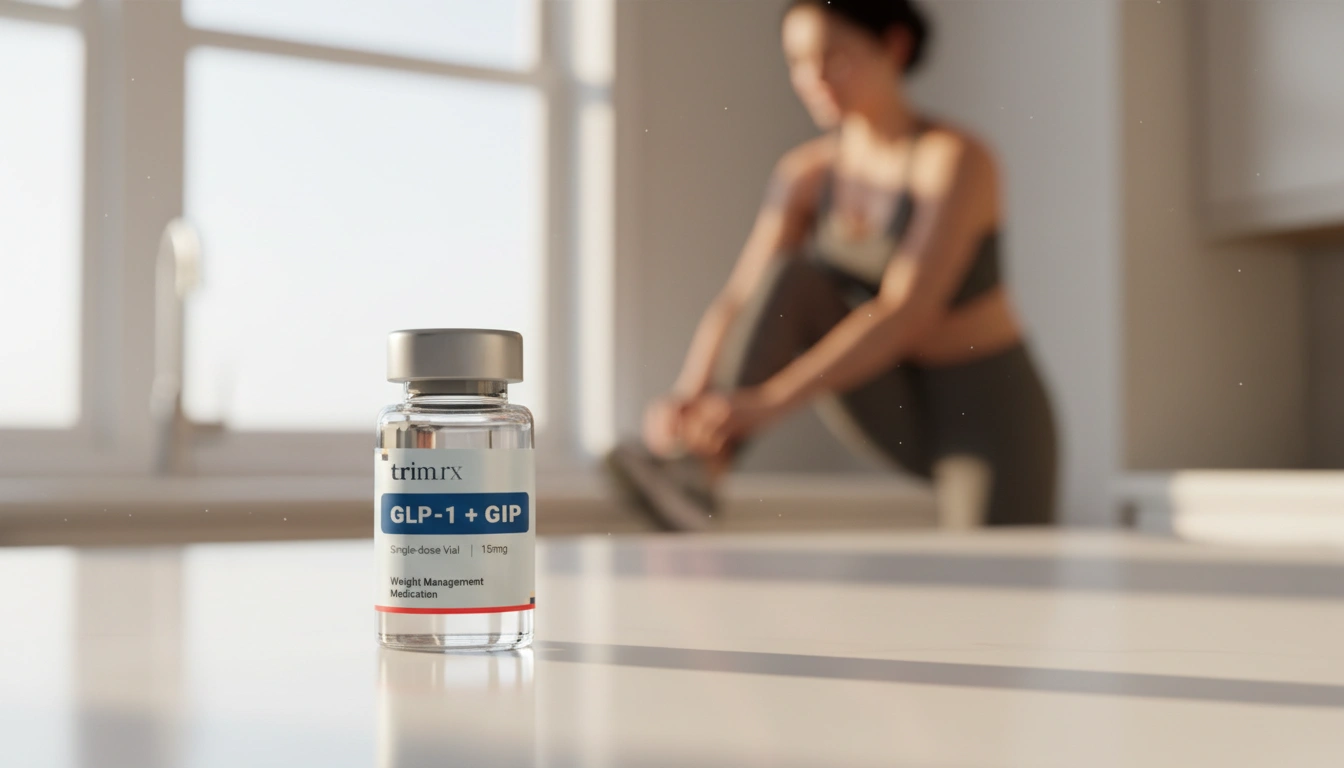Can GLP-1 Cause Diarrhea? Understanding the Connection

Introduction
Have you ever felt the unsettling rush of urgency after a meal? If you’re on a weight loss journey or managing diabetes with GLP-1 medications, you may have experienced this discomfort. It’s not just a coincidence; it’s a common side effect associated with these medications. As we delve into the intricacies of GLP-1 drugs and their gastrointestinal effects, we aim to provide insights that can help you navigate your health journey more effectively.
GLP-1 agonists—medications like Ozempic, Wegovy, and Mounjaro—are designed to assist in managing blood sugar levels and promoting weight loss. However, with their benefits often come a range of side effects, including gastrointestinal issues such as diarrhea. Understanding why this happens and how to manage it is crucial for anyone considering or already using these medications.
In this blog post, we will explore the following aspects:
- What are GLP-1 Agonists?: Understanding their function and purpose.
- The Mechanism Behind Diarrhea: How GLP-1 medications affect your digestive system.
- Common Side Effects of GLP-1 Medications: A closer look at gastrointestinal symptoms.
- Management Strategies for Diarrhea: Practical tips to alleviate discomfort.
- When to Seek Medical Advice: Recognizing when it’s time to consult a healthcare professional.
By the end of this post, you will have a clearer understanding of the relationship between GLP-1 medications and diarrhea, along with strategies to manage this side effect effectively.
What are GLP-1 Agonists?
GLP-1 agonists, or glucagon-like peptide-1 receptor agonists, are a class of medications that mimic the actions of the GLP-1 hormone, which is naturally released in the intestines in response to food intake. This hormone plays a pivotal role in regulating glucose metabolism and appetite control.
These medications work by:
- Stimulating insulin secretion when blood sugar levels are high.
- Suppressing the release of glucagon, a hormone that raises blood sugar levels.
- Slowing gastric emptying, which helps you feel fuller longer.
Originally developed for managing type 2 diabetes, GLP-1 agonists have gained popularity for their weight loss benefits. The FDA has approved several of these drugs for weight management, and they are often prescribed to individuals with obesity or overweight conditions.
Key GLP-1 Medications
Some of the most common GLP-1 medications include:
- Semaglutide (marketed as Ozempic for diabetes and Wegovy for weight loss)
- Liraglutide (Victoza for diabetes and Saxenda for weight loss)
- Tirzepatide (Mounjaro and Zepbound)
- Dulaglutide (Trulicity)
Each of these medications works similarly, but they may differ in their dosing, administration routes, and specific indications.
The Mechanism Behind Diarrhea
Understanding why GLP-1 medications can cause diarrhea requires a closer look at their effects on the gastrointestinal system. One of the primary actions of these drugs is to slow gastric emptying. While this can help in reducing food intake and enhancing satiety, it can also disrupt normal digestive processes.
How Diarrhea Occurs
- Stomach Emptying: By delaying gastric emptying, GLP-1 medications alter the normal rhythm of digestion. This can cause food to linger in the stomach longer than usual, leading to increased pressure in the upper gastrointestinal tract.
- Stool Reflex: The presence of food in the gastrointestinal tract stimulates the bowel to process and move digested food along. For some individuals, this reflex can become overstimulated, resulting in rapid transit through the intestines and leading to diarrhea.
- Changes in Gut Flora: Some studies suggest that GLP-1 agonists can affect gut microbiota, potentially contributing to gastrointestinal symptoms, including diarrhea.
The combination of these factors means that while many patients benefit from the appetite suppression and weight loss associated with GLP-1 medications, they may also face uncomfortable digestive side effects.
Common GI Side Effects
Apart from diarrhea, individuals taking GLP-1 medications may experience:
- Nausea: Often reported as one of the most common side effects, nausea typically subsides as the body adjusts to the medication.
- Vomiting: This can occur, especially during the initial stages of treatment.
- Constipation: This may seem counterintuitive due to the diarrhea risk, but some patients may experience constipation due to slowed digestion.
The gastrointestinal side effects usually vary in intensity among individuals and may decrease over time as the body adjusts to the medication.
Management Strategies for Diarrhea
Experiencing diarrhea while on GLP-1 medications can be distressing, but there are several strategies we can use to manage this side effect effectively.
Dietary Adjustments
- Hydration is Key: Staying hydrated is crucial, especially if diarrhea leads to fluid loss. Drinking water, broth, or electrolyte solutions can help maintain hydration levels.
- Small, Frequent Meals: Instead of large meals, opting for smaller, more frequent meals can ease digestive pressure and help regulate bowel movements.
- Avoid Trigger Foods: Certain foods may exacerbate diarrhea. It’s advisable to limit:
- High-fiber foods, which can increase stool bulk.
- Dairy products, especially if lactose intolerant.
- Foods rich in sugar alcohols, which can lead to bloating and diarrhea.
- Consider a Bland Diet: A bland diet, consisting of foods like bananas, rice, applesauce, and toast (the BRAT diet), may help stabilize bowel movements.
- Limit Fatty and Spicy Foods: High-fat and spicy foods can irritate the gastrointestinal lining and should be minimized during episodes of diarrhea.
Over-the-Counter Solutions
For some, over-the-counter medications like loperamide (Imodium) can provide relief from diarrhea. However, it’s important to consult with a healthcare provider before starting any new medication.
Monitor Symptoms
Keeping a food and symptom diary can help identify specific triggers or patterns unique to your experience. This can be beneficial to share with your healthcare provider for personalized adjustments to your treatment plan.
When to Seek Medical Advice
While diarrhea is a recognized side effect of GLP-1 medications, it’s essential to know when to contact a healthcare professional. If diarrhea becomes severe, persistent, or is accompanied by other concerning symptoms—such as dehydration, severe abdominal pain, or blood in the stool—immediate medical attention is warranted.
Additionally, if you find that gastrointestinal issues are significantly impacting your daily life or leading to discontinuation of the medication, discussing alternatives or adjustments with your provider is crucial.
Conclusion
Understanding the connection between GLP-1 medications and diarrhea is vital for anyone navigating weight loss or diabetes management with these treatments. While these medications offer significant benefits, managing their side effects is equally important for maintaining a quality lifestyle.
By applying dietary adjustments, staying hydrated, and seeking medical advice when necessary, we can work together to manage any discomfort that arises. Remember, your health journey is personal, and finding what works best for you can make all the difference.
As we continue to embrace healthier lifestyles, we encourage you to explore personalized weight loss solutions that prioritize your well-being. If you’re considering a tailored weight loss program, we invite you to take our free assessment quiz to determine your eligibility for our prescription medications. Let’s embark on this journey towards better health together!
FAQ
How long does diarrhea last when starting GLP-1 medications?
Diarrhea can vary in duration but often improves within the first few weeks as your body adjusts to the medication. Most individuals experience mild symptoms that resolve over time.
Is it common to experience both diarrhea and constipation with GLP-1 medications?
Yes, some individuals may experience both symptoms. This can be due to varying reactions to the medication and the digestive changes it induces.
What should I do if diarrhea becomes severe?
If diarrhea is severe or accompanied by other symptoms like abdominal pain or dehydration, it’s essential to seek medical attention promptly.
Can dietary changes really help manage diarrhea associated with GLP-1 medications?
Yes, making specific dietary adjustments can significantly alleviate gastrointestinal discomfort. Staying hydrated and being mindful of food choices can help stabilize your digestive health.
Are there alternatives to GLP-1 medications if I can’t manage the side effects?
Yes, there are various weight loss solutions available. Discussing your options with a healthcare provider can help you find a method that suits your needs without intolerable side effects.

Transforming Lives, One Step at a Time
Keep reading
China’s Supreme Court Upholds Semaglutide Patent for Novo Nordisk
China’s Supreme People’s Court upholds Novo Nordisk’s semaglutide compound patent, supporting IP protection.
Over 600,000 Californians Risk Losing Access to GLP-1 Weight-Loss Drugs
California’s Medi-Cal will stop covering GLP-1 weight-loss drugs for weight-loss-only prescriptions, effective Jan. 1, 2026.
Weight-Loss Pill Approval Likely to Prompt Overhaul of Packaged Food and Fast-Food Products
FDA approval of GLP-1 weight-loss pills may prompt food makers and restaurants to shift to high-protein, smaller-portion products.



